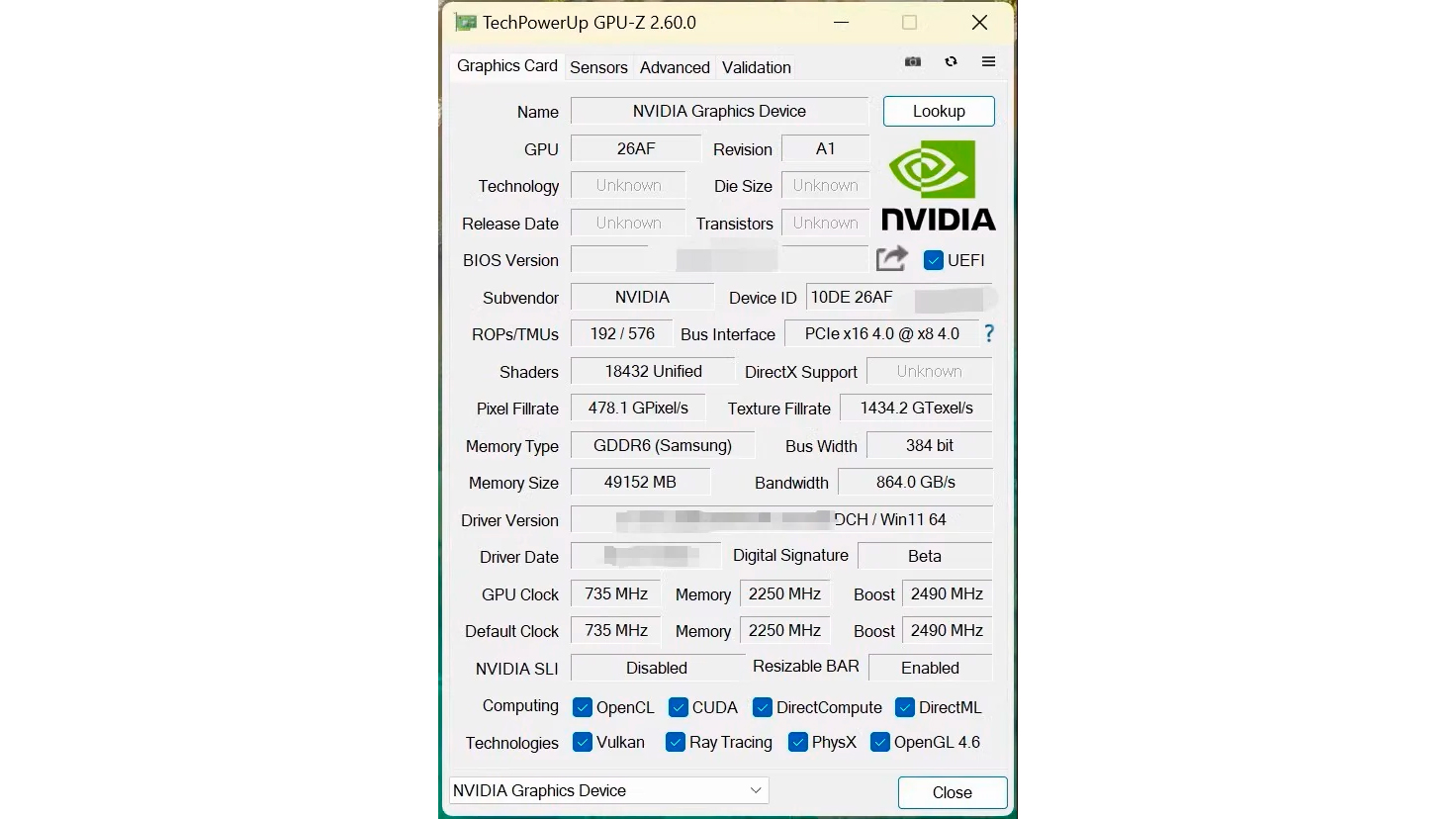Specs of Nvidia’s unreleased RTX Titan Ada GPU have allegedly surfaced on Reddit. A GPU-Z screenshot and {photograph} shared by FluxRBLX on the Nvidia subreddit reveals the rumored however by no means shipped RTX Titan Ada GPU specs that includes a totally enabled AD102 GPU and a whopping 48GB of VRAM.
The GPU-Z screenshot reveals many particulars on the purported Titan Ada GPU prototype, together with core counts, reminiscence configuration, machine ID, and extra. The GPU would have had 18,432 shaders (CUDA cores), 192 ROPs, 576 TMUs, a pixel fillrate of 478.1 GPixel/s, and a Texture Fillrate of 1,434.2 GTexel/s. The reminiscence subsystem has 48GB of capability (48GiB if we’re being exact), that includes GDDR6 (non-x) ICs on a 384-bit large reminiscence interface with 864 GB/s of reminiscence bandwidth.
Base clock speeds are considerably decrease than any outgoing RTX 40 series (Ada Lovelace) GPU, with GPU-Z reporting a clock velocity of simply 735 MHz. Nevertheless, enhance clocks look much more standard, rated at 2,490 MHz. The abnormally low base clocks are seemingly a byproduct of the early nature of the {hardware}, as this card was purportedly a prototype. That might additionally clarify the usage of GDDR6 as a substitute of GDDR6X.
In comparison with the RTX 4090, the RTX Titan Ada outclasses it in shader depend and reminiscence capability. The Titan Ada encompasses a absolutely enabled AD102 die, which might have made it the one RTX-branded GPU within the 40-series household to have a totally unlocked die. The RTX 4090 has entry to 89% of the AD102 die.
Reminiscence capability can be doubled on the Titan Ada GPU, inevitably attributable to utilizing a “clamshell” configuration with the GDDR6 modules on either side of the PCB, much like the RTX 3090 or RTX 6000 Ada. GDDR6 producers do not make GDDR6 reminiscence chips with a capability larger than 2GB, making this configuration the one choice to attain 48GB on the Titan-class GPU.

One space the place the RTX 4090 outperforms the Titan Ada is in reminiscence bandwidth, thanks solely to its GDDR6X reminiscence. The Titan Ada prototype had slower GDDR6 reminiscence modules, which reduces its bandwidth potential in comparison with the RTX 4090. Nvidia both did not plan to make use of the faster GDDR6X modules, or maybe it by no means bought that far. Cooling could have been a priority because of the clamshell structure of the reminiscence chips; the RTX 3090 was shipped in the identical configuration because the GDDR6X modules, however the RTX 3090 additionally suffered from memory temperature issues.
The Reddit poster additionally shared a PCB shot of the supposed RTX Titan Ada GPU. Assuming the picture is legit, the PCB appears just about equivalent to equal RTX 4090 PCBs. The enormous AD102 die is within the center, flanked by 12 of 24 reminiscence ICs. The GPU and reminiscence energy supply parts line the correct and left sides of the PCB. The PCB pictured is probably going a reference design, as Nvidia does not usually enable non-reference Titan playing cards (even when it does not have “Founders Version” branding).
Since this GPU was by no means launched, Nvidia hasn’t defined why it by no means introduced the RTX Titan Ada to the market. Nevertheless, Nvidia seemingly canceled the product attributable to inner competitors that may have arisen between it and workstation-class GPUs, such because the RTX 6000 Ada that sells for $6,800. Moreover, AMD did not have a solution for the RTX 4090, so the RTX Titan Ada might need been overkill, a minimum of for the common gamer.








